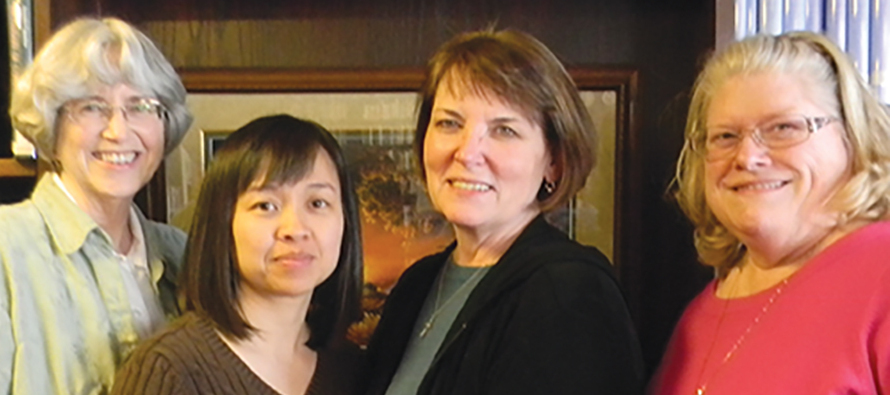Obstacles and options for older discerners

Image: SISTERS IN FORMATION at Mother of God Monastery in Watertown, S.D.: (from left) Sister Terri, Novice Aica, Sister Nancy, and Novice Denise.
The norm for making a lifelong commitment—be it a career choice or way of life—is to do it while you’re young in your mid-20s or 30s. But for a growing number of men and women, commitment readiness is delayed or deferred. When they are finally free to choose the path where they feel called—namely religious life—they find that their age is a barrier to joining a religious community. It may seem unfair or unreasonable, but communities with age-limits have them for a number of reasons related to the life, ministry, and finances of the community.
As the population within many religious communities ages, it is vital for their future to have younger members to continue their mission and adapt their ministries to the needs of a new generation.
Communities also set age-limits because of the time and demands of the formation process. By middle age most people’s habits are set, and it is often harder for them to change and adapt to the particular rhythms and practices of community life.
Additionally, many communities have restrictions during the novitiate year—one of the initial stages of entering a religious community—such as limits on computer use, evenings out, and even work. People over 45 who have lived independently for years can find these conditions difficult if not impossible. Likewise the communal living of religious life involves accountability to a superior and other community members—and that, too, can seem jarring to those who have lived into middle age answering mostly to themselves about personal choices.
Particularly for smaller communities, the toll—both emotionally and financially—of caring for new members nearing or already in their senior years would be too much for the community to bear. And for communities preparing men for priesthood, the cost and time of seminary education—up to eight years—is often considered disproportionate for older candidates in light of the number of years they would be able to serve.
In spite of these factors, not all religious communities have an age-limit. There are communities that will consider each person on an individual basis. “We clearly see tremendous benefits in accepting women who are in their 40s and 50s into community,” says Sister Adrienne Kaufmann, O.S.B. of Mother of God in Watertown, South Dakota. “God is definitely calling them; they make amazing contributions to community!”
In the end, say vocation directors, God does the calling, and no matter your age and your interests, if you surrender yourself freely to God and remain open, you will find the place God wants you to be.
QUESTIONS FOR DISCERNERS OVER 40
The VISION Vocation Network has resources for older discerners at http://www.vocationnetwork.org/articles/show/235 OTHER VOCATION OPTIONS FOR OLDER CANDIDATES Other options for consecrated life that may not involve age restrictions: THIRD ORDER: Secular third orders are associations of laypeople who follow the inspiration and guidance of a religious order while living in the world. Third order members are usually received into the religious community in a particular ceremony and pledge themselves to certain prayers and religious practices. ASSOCIATE: Some religious orders now include associate membership, which allows single and married laypeople to maintain a close bond with the community. Generally, associate members feel drawn to the charism—the spirit and mission—of the community and pledge to carry out prayer and works of service according to the community’s charism. They usually take part in some communal activities of the community. SECULAR INSTITUTE: Secular institutes are a form of consecrated life in which members live a life of celibate chastity, poverty, and obedience through the witness of their Christian lives and their apostolic activity wherever they are employed. Generally, members do not live in community as do members of religious institutes, though they may. Secular institutes are for laywomen, laymen, and diocesan priests. Periodically, members of respective institutes come together for retreats, meetings, and renewal. |
Tags
- discernment
- third orders
- associates
- secular institutes
- older discernment
- vocations over 30
- vocations over 40
Related
- Questions you’ll be glad you asked
- What monastic mystics got right about life
- Religious communities embrace diverse members
- How my parents responded when I became a brother
- Vocation Basics: You are already called—Message to youth from Pope Francis
- Meet the parents
- Charism: The gift that shapes lives
- What our vows mean
- Discover five treasures of religious life
- Religious making a difference Read More
Most Viewed
- Find your spirituality type quiz
- Questions and answers about religious vocations
- Celibacy quiz: Could I be a nun? Could I be a brother? Could I be a priest?
- Resources for older discerners or those with physical and developmental differences
- About Vocation Network and VISION Guide


 Carol Schuck Scheiber is content editor of VISION.
Carol Schuck Scheiber is content editor of VISION.